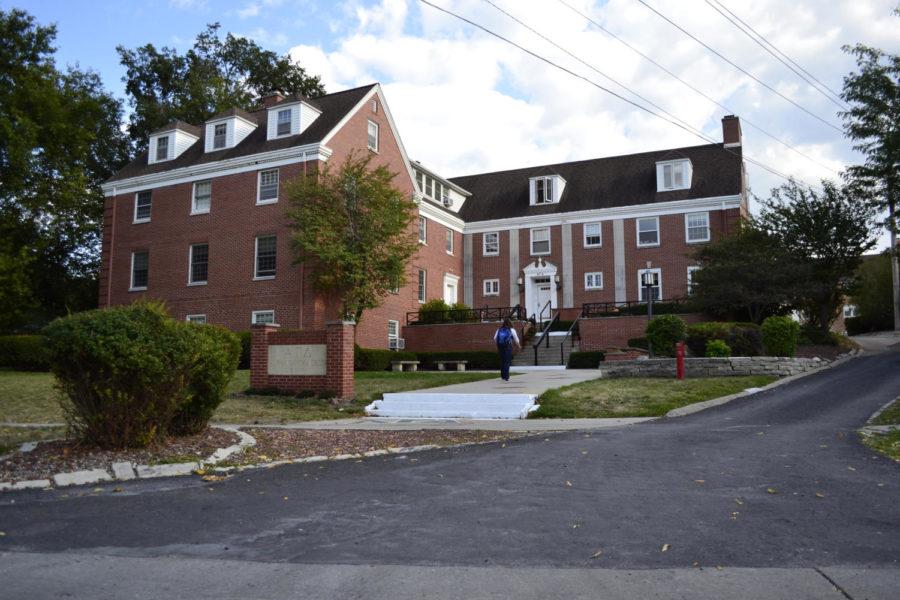Maxwell: Greek rental inspections unnecessary
Brian Achenbach/Iowa State Daily
Last week, the Ames City Council talked about how fraternities and sororities are not exempt from a housing code. Meeting the specifications of the code would require the investment of substantial funds.
September 25, 2013
Last week, the Ames City Council had a discussion over how fraternities and sororities are not listed as being exempt from the Rental Housing Code (Ames City Code Chapter 13).
Because these chapter houses have not previously been kept to such standards, meeting the specifications of this code now would require their organizations to invest substantial resources. In response, members of the greek community filled City Hall to capacity on Sept. 17 to communicate that they support an exemption of the code for fraternities and sororities.
For the sake of full disclosure, I will mention that I was at that City Council meeting representing my fraternity with several of my brothers. I attended the meeting because as the president of our chapter, I am very keenly aware of the tremendous effort that would be necessary to follow these regulations.
So why would the Ames City Council consider fraternities and sororities separately from other types of rental properties in Ames? What is the difference between a fraternity or sorority and other rental properties?
The most obvious disparity is that greek houses are not made available to the general public for occupancy, because only persons affiliated with their organization are allowed as tenants. These organizations are allowed to discriminate to the point that the overwhelming majority of the city’s residents are not allowed to live in their facilities. In 2010, the Ames population was 58,965; the average membership of chapters with houses was 65. For each chapter, essentially 99.9 percent of Ames residents will never be able to consider their house as a possible place to live.
The people who compose the remaining 0.1 percent must already be members. The process of becoming a tenant requires them to bound themselves to the laws and authority of the organization that oversees the operation of the chapter. They must also have agreed to follow the rules set forth by the Office of Greek Affairs and their chapter’s respective governing council. It is obvious that these houses are not public rental properties.
It does make sense at first to apply a Rental Housing Code to a facility that issues rental agreements, but the fact that a facility enters into rental contracts should not be the determining factor in deciding that a facility should be required to meet that Code. In fact, fraternities and sororities are specifically exempt from the state regulations that govern rental agreements, the Uniform Residential Landlord and Tenant Law (Iowa Code 562A). Their exemption from rental regulations demonstrates that even though rental agreements are issued, the state government does not consider these facilities to operate in the same way as those that are for rent to the general public.
Even if chapters do not need to meet the housing code, there are many other regulations that these fraternities and sororities must continue to meet. Each is governed by its respective international or national organization, which includes risk assessment evaluations on at least an annual basis, including inspections of its chapter facilities. They are also required to meet their hosting organization’s insurance specifications and are inspected regularly to determine compliance with safety standards set by the agency. As stated by members of the City Council themselves, the ISU Office of Greek Affairs also requires each chapter to meet standards to remain open.
Because they are residential buildings, fraternity and sorority facilities are already governed under the residential building provisions of the City of Ames Municipal Code Chapter 5 — Building, Electrical, Mechanical and Plumbing Code. This code is what the city of Ames uses to make sure buildings in Ames are safe for its residents.
Many rental facilities have landlords who are responsible for the conditions of the housing they provide. Respectively, members of each greek chapter are designated by the corporation or organization that owns their facility to constantly ensure it remains in acceptable condition and respond promptly to any issues the residents may have with the facility.
Clearly, fraternities and sororities have many systems in place separate from the housing code. There is not any genuine need to for Ames to place these organizations’ facilities under the same regulations as other rental properties, because they are fundamentally different and are already being held to high standards by multiple authorities.
Fraternities and sororities at Iowa State have a general history of operating successfully, in many cases for more than 100 years. The same is true in many areas of the country, which the City Council used to gain perspective. They conducted a survey of 13 other college communities and found that only two performed these types of inspections, neither of which were located in Iowa.
Here at Iowa State, it is apparent that we, too, do not have any reason to conduct them.







